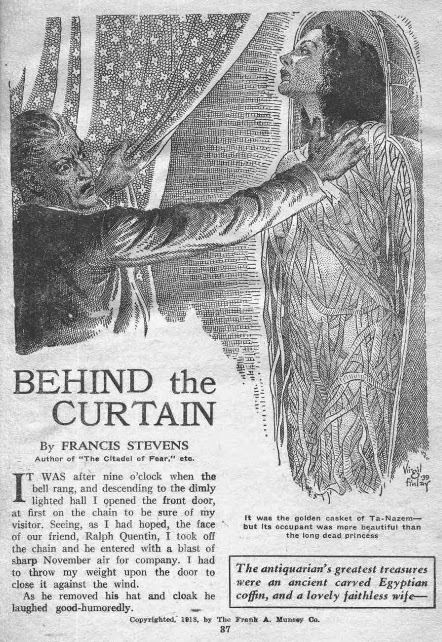RETROSPECTIVE: Behind the Curtain by Francis Stevens
Thursday , 11, February 2016 Before the Big Three 4 Comments This story had the potential to be a masterpiece. The pacing, the cascade of hints that gradually snap into focus, and most of all, a character that really does come across as the “very apotheosis of hatred”– wow! As I was reading it I wanted to compare it to Edgar Allan Poe, even. Then I got to the end and the spell was shattered.
This story had the potential to be a masterpiece. The pacing, the cascade of hints that gradually snap into focus, and most of all, a character that really does come across as the “very apotheosis of hatred”– wow! As I was reading it I wanted to compare it to Edgar Allan Poe, even. Then I got to the end and the spell was shattered.
I don’t know what it is with Francis Stevens, but she is downright stingy with her payoffs. The Philosopher’s Stone from “The Nightmare” had the potential to “upset the financial systems of the entire world.” At the end, though, it turned out be good for only about a million rubles. The Citadel of Fear introduces a mythical city that has “a lumber-room– for gold!” It was loaded with all kinds of solid gold urns, vases, chests, and furniture. At the end, though, it turns out that the gold on these relics is nothing more than a “thin coat laid over solid-copper.”
Here in “Behind the Curtain”, the diabolical plot we are shown turns out to be nothing but a dream. This is precisely the sort of anticlimax that Lovecraft warned against. If he had written it, there would be some sort of kicker that only comes clear in the final paragraphs– something that would make you think that this horrible person is ten times worse than you initially thought. In contrast, Francis Stevens not only has a penchant to leave no mystery unexplained, she leaves the reader puzzling over just how a guy whose subconscious is brimming over with viciousness can blithely decide he’s fine with his wife sleeping around on him.
Just like incomprehensibly vast treasures in reality turn out to be nothing special, the “apotheosis of hate” here is little more than a putz. Whatever horror and wonder and suspense were conveyed is, in the end, fairly well defused. That’s maybe a legitimate way to write a story, I guess… but Lovecraft’s way is better.
I recently read her short story “The Elf Trap” in an anthology of Pre-Tolkienian fantasy (that was literally the conceit; it was called “Before Tolkien” or something). It had a great build-up, but wrapped with that “Wait, what are you doing?”/They’re-Coming-To-Take-Me-Away-Ha-Ha ending which afflicts so much “Lovecraftian” fiction.
I’ve always thought Lovecraft had plenty of anticlimatic let-downs as well, though. When he was really on, he was ON, but he very often wasn’t.
And sometimes, as in At The Mountains of Madness, he almost seemed to deliberately humanize his monsters, undercut his own building of tension, and then just give us a confused hot mess at the end. That story’s almost better for the story that you get reading between the lines than for what the one that’s immediately available on the face of it.
And although leaving some mysteries unexplained isn’t a bad idea; at the same time, readers of stories about monsters come for the monster, and certainly expect to see it.
-
I don’t know… I think it was Stephen King who said that he doesn’t like to really show the monster in his books because your imagination is going to be much worse (plus tailored directly to what scares you personally the most) than anything he can come up with — the monsters he devises would always tend to be a let-down. But at the same time, I agree, a lot of HPLs work could have benefited from an editor more like John W. Campbell…